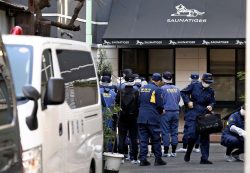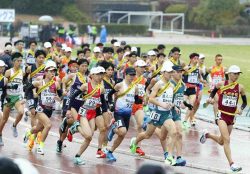14:30 JST, January 16, 2021
Are penalties on restaurants essential for controlling the spread of the novel coronavirus? Whether they should be introduced must be debated calmly.
The government plans to submit a bill to revise the special measures law to cope with new strains of influenza to the ordinary Diet session. It is seeking the cooperation of the opposition parties and is aiming for early passage.
The number of infected people is rapidly increasing, and the medical system is under pressure. The government’s responses have been lagging behind, and effective measures are limited. The government apparently wants to emphasize its commitment to curbing infections by coming up with stronger measures.
The main pillar of the proposed revision is the introduction of penalties. Governors will be able to order eating and dining establishments to suspend operations or to shorten their business hours, and administrative fines will be imposed if an order is not complied with. The law will also stipulate that financial support will be provided to businesses that cooperate.
Under the current law, businesses are asked to voluntarily cooperate in suspending operations: There is no compulsion to do so. The introduction of penalties seems to be aimed at increasing the effectiveness of the measures.
However, careful consideration must be made when it comes to increasing restrictions on private rights. Are there rational grounds to conclude that penalties will lead to countering infections? The government must carefully explain this matter to the public.
It is the National Governors’ Association that has been calling for a revision of the law that would stipulate penalties.
Governors, who are dealing with the crisis directly, may be seeking greater authority. However, there are many restaurants and it is not easy to apply penalties fairly. The first priority must be the central and local governments working closely together to increase confidence in responses to measures against the infectious disease and to gain understanding from businesses.
The government intends to provide up to ¥60,000 per day as cooperation money for restaurants that respond to requests for shortened opening hours.
Some businesses may not be able to comply with the request if they want to maintain their business and continue employing their staff. The government needs to work out the appropriate level of benefits.
The government is considering revising the Infectious Diseases Law to impose criminal penalties, including imprisonment, on coronavirus patients who fail to comply with a hospitalization order or who leave the hospital.
There are concerns that using the threat of penalties to make patients self-isolate may arouse feelings of discrimination among the public. It would have the opposite effect if some people do not seek medical treatment for fear of discrimination or hide the fact that they are infected even after it is discovered.
Even though compulsory hospitalizations are being considered, the reality is that an increasing number of people are forced to stay at home to recover because there are no available beds in hospitals or vacancies at designated accommodation facilities. It is more important for the central and local governments to speed up the securing of hospital beds and the expansion of support for people undergoing treatment.
As the infection situation worsens, the tendency is to believe that restrictions on private rights are unavoidable, but careful thought must be given so that the revised law will not go too far.
"Editorial & Columns" POPULAR ARTICLE
-

Violations of Subcontract Law: Major Automakers Must Eliminate Old Practices
-

Local Governments’ Tax Revenues: Devise Ways to Correct Imbalances in Tax Sources
-

5 Japanese Business Dinner Mistakes to Avoid — and What They Taught Me About Business in Japan
-

Heavy Rains in Asia: Support for Victims, Flood-Control Measures Urgently Needed
-

Rice Coupons: A Misguided Approach to Countering Rising Prices
JN ACCESS RANKING
-

Keidanren Chairman Yoshinobu Tsutsui Visits Kashiwazaki-Kariwa Nuclear Power Plant; Inspects New Emergency Safety System
-

Imports of Rare Earths from China Facing Delays, May Be Caused by Deterioration of Japan-China Relations
-

University of Tokyo Professor Discusses Japanese Economic Security in Interview Ahead of Forum
-

Tokyo Economic Security Forum to Hold Inaugural Meeting Amid Tense Global Environment
-

Japan Pulls out of Vietnam Nuclear Project, Complicating Hanoi’s Power Plans





















